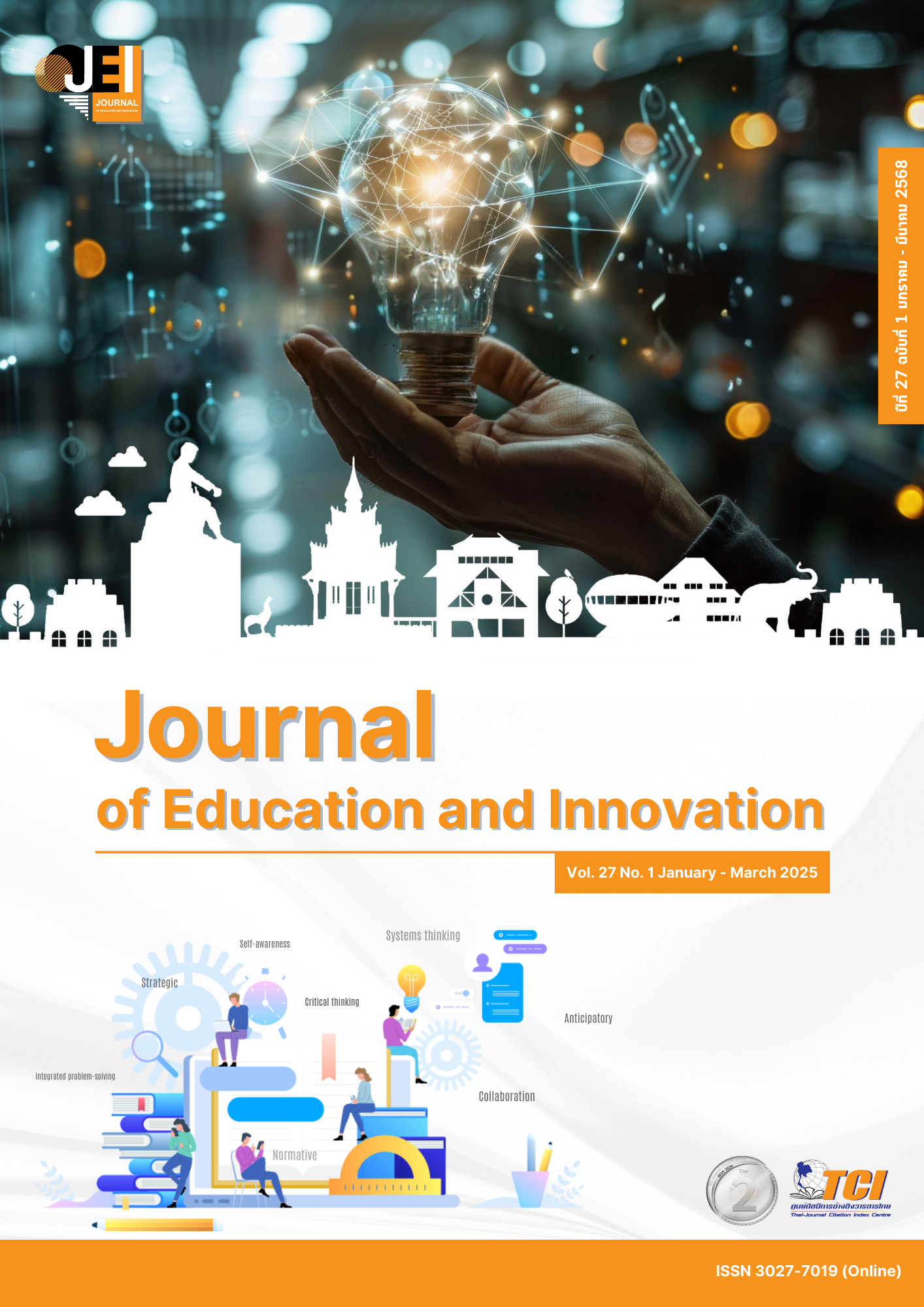แนวทางการยกระดับความฉลาดรู้ทางปัญญาประดิษฐ์ของครูไทยในยุคดิจิทัล
Main Article Content
บทคัดย่อ
ครูในประเทศไทยจำเป็นต้องปรับตัวเพื่อให้ก้าวทันโลกที่เปลี่ยนแปลงไปอย่างรวดเร็วในยุคดิจิทัล การวิจัยครั้งนี้ จึงมีวัตถุประสงค์เพื่อ 1) ศึกษาระดับความฉลาดรู้ทางปัญญาประดิษฐ์ของครูไทย 2) เพื่อวิเคราะห์ปัจจัยที่ส่งผลต่อความฉลาดรู้ทางปัญญาประดิษฐ์ของครูไทย 3) เพื่อพัฒนาแนวทางการยกระดับความฉลาดรู้ทางปัญญาประดิษฐ์ของครูไทย การศึกษาครั้งนี้ใช้การวิจัยผสมวิธี (Mixed Methods Research) แบบเชิงอธิบายเป็นลำดับ (Explanatory Sequential Design) เริ่มจากการสำรวจระดับความฉลาดรู้ทางปัญญาประดิษฐ์ของครูไทย จำนวน 584 คน และวิเคราะห์ปัจจัยที่ส่งผลต่อความฉลาดรู้ทางปัญญาประดิษฐ์ด้วยการสัมภาษณ์แบบกึ่งโครงสร้าง (Semi-Structured Interview) กับครูไทยจำนวน 12 คน ที่เป็นกรณีศึกษาจากตัวอย่างวิจัยในระยะก่อนหน้า จากนั้นนำผลการวิเคราะห์ข้อมูลที่ได้ มาสังเคราะห์เป็นร่างแนวทางการยกระดับความฉลาดรู้ทางปัญญาประดิษฐ์ของครูไทย และนำไปให้ผู้ทรงคุณวุฒิตรวจสอบคุณภาพและความเหมาะสม ผลการวิจัย พบว่า ระดับความฉลาดรู้ทางปัญญาประดิษฐ์ของครูไทยอยู่ในระดับปานกลาง (M = 2.89, SD = 0.70) โดยครูมีความตระหนักรู้ถึงประโยชน์ของปัญญาประดิษฐ์ แต่ขาดความคล่องแคล่วในการใช้งาน ปัจจัยที่มีผลต่อระดับความฉลาดรู้ทางปัญญาประดิษฐ์ของครูไทย ได้แก่ ปัจจัยด้านเทคโนโลยี ปัจจัยด้านบุคคล และ ปัจจัยด้านสภาพแวดล้อม การพัฒนาแนวทางการส่งเสริมความฉลาดรู้ทางปัญญาประดิษฐ์ครอบคลุม 3 ด้าน ได้แก่ การดำเนินการสำหรับผู้บริหารสถานศึกษา การดำเนินการสำหรับครู และการดำเนินการสำหรับการออกแบบหลักสูตรอบรมและกิจกรรมที่ส่งเสริมการยกระดับระดับความฉลาดรู้ทางปัญญาประดิษฐ์ของครูไทย โดยเน้นการใช้ปัญญาประดิษฐ์อย่างมีจริยธรรมและปลอดภัย การวิจัยนี้เป็นประโยชน์ในการยกระดับความฉลาดรู้ทางปัญญาประดิษฐ์ของครูไทย ช่วยให้หน่วยงานที่เกี่ยวข้องกำหนดนโยบายการใช้ปัญญาประดิษฐ์ในการศึกษาเพื่อเตรียมครูให้พร้อมต่อการเปลี่ยนแปลงในยุคดิจิทัล ยิ่งไปกว่านั้น การส่งเสริมความเข้าใจและการใช้ปัญญาประดิษฐ์อย่างมีความรับผิดชอบ จะช่วยสร้างรากฐานที่แข็งแกร่งให้กับระบบการศึกษาไทย ส่งผลให้สังคมไทยโดยรวมสามารถใช้ประโยชน์จากเทคโนโลยีปัญญาประดิษฐ์ได้อย่างเต็มศักยภาพ นำไปสู่การพัฒนาทางเศรษฐกิจ สังคม และวัฒนธรรมอย่างยั่งยืน
Article Details

อนุญาตภายใต้เงื่อนไข Creative Commons Attribution-NonCommercial-NoDerivatives 4.0 International License.
เจ้าของบทความมิได้คัดลอก หรือละเมิดลิขสิทธิ์ของผู้ใด หากเกิดการละเมิดลิขสิทธิ์ ไม่ว่าวิธีใด หรือการฟ้องร้องไม่ว่ากรณีใด ๆ ที่อาจเกิดขึ้นได้ กองบรรณาธิการวารสารศึกษาศาสตร์ ไม่มีส่วนเกี่ยวข้องทั้งสิ้น ให้เป็นสิทธิ์ของเจ้าของบทความที่จะดำเนินการ
เอกสารอ้างอิง
COMEST. (2019). Preliminary study on the Ethics of Artificial Intelligence. Retrieved from https://unesdoc.unesco.org/ark:/48223/pf0000367823
Economou, A. (2023). Building teachers’ digital competence through a self-reflection process. In S. James & C. Elizabeth (Eds.), Proceedings of the 3rd Annual Meeting of the International Society of
the Learning Sciences (pp. 1242–1245). DOI: 10.5220/0007679005410548
Education Technology Development and Integration Support (ETS). (2024). AI and Future Education 2030: Opportunities and Challenges. Retrieved from https://www.ets.kmutt.ac.th/post/ai-in-education
European Commission. (2018). Communication Artificial Intelligence for Europe. Retrieved from https://digital-strategy.ec.europa.eu/en/library/communication-artificial-intelligence-europe9
European Commission. (2017). The European Framework for the Digital Competence of Educators. Retrieved from https://publications.jrc.ec.europa.eu/repository/handle/JRC107466
European Commission. (2022). Ethical guidelines on the use of artificial intelligence and data in teaching and learning for educators. Retrieved from https://education.ec.europa.eu/news/ethical-guidelines-on-the-use-of-artificial-intelligence-and-data-in-teaching-and-learning-for-educators
Haenlein, M., & Kaplan, A. (2019). A Brief History of Artificial Intelligence: On the Past, Present, and Future of Artificial Intelligence. Sage Journal, 61(4). DOI: 10.1177/0008125619864925
Hagendorff, T. (2020). The ethics of AI ethics: An evaluation of guidelines. Minds and Machines, 30(1), 99-120.
Korinek, A., & Stiglitz, J. E. (2021). Artificial intelligence, globalization, and strategies for economic development (No. 28453). Retrieved from http://www.nber.org/papers/w28453
McBride. (2015). Children's Literacy Development. Routledge: London.
McCarthy. (2007). What is Artificial Intelligence? Retrieved from https://www-formal.stanford.edu/jmc/whatisai.pdf
Ng, T. K., Leung, J. K. L., Chu, K. W. S., & Qiao, M. S. (2021). AI literacy: Definition, teaching, evaluation and ethical issues. Proceedings of the Association for Information Science and Technology, 58(1), 504-509.
Nunnally, J. C., & Bernstein, I. H. (1994). The Assessment of Reliability. Psychometric Theory, 3, 248-292.
Robinson, S. C. (2020). Trust, transparency, and openness: How inclusion of cultural values shapes Nordic national public policy strategies for artificial intelligence (AI) Technology in Society, 63, 101421.
Sriwat, K. (2023). When education faces AI: What aspects does Thai education need? The 101 World. Retrieved from https://www.the101.world/ai-for-teaching-and-learning/
Steinbauer-Wagner, G., Kandlhofer, M., Chklovski, T., Heintz, F., & Koenig, S. (2021). A Differentiated Discussion About AI Education K-12. Künstliche Intelligenz, 35(2), 131-137. DOI: 10.1007/s13218-021-00724-8
Suksomanat, N., & Moolsilpa, P. (2023). Model to enhance the potential of computer engineering students in artificial intelligence case study: three public universities in Bangkok (Doctoral dissertation). Bangkok: Srinakharinwirot University.
UNESCO Institute for Information Technologies in Education (UNESCO IITE). (2020). AI in Education: Change at the Speed of Learning. Retrieved from https://unesdoc.unesco.org/ark:/48223/pf0000374947?posInSet=55&queryId=
edd622-6c66-452e-930c-666cd7182bdf
UNESCO. (2018). UNESCO ICT Competency Framework for Teachers. Retrieved from https://unesdoc.unesco.org/ark:/48223/pf0000265721
UNESCO. (2021). AI and Education: Guidance for Policy-Makers. DOI: 10.54675/PCSP7350.
UNESCO. (2023a). Guidance for generative AI in education and research. DOI: 10.54675/EWZM9535
UNESCO. (2023c). How generative AI is reshaping education in Asia-Pacific. Retrieved from https://www.unesco.org/en/articles/how-generative-ai-reshaping-education-asia-pacific
UNESCO. (2024). Global Toolkit on AI and the Rule of Law for the Judiciary. UNESCO: Paris.
UNICEF Innocenti. (2023). Policy guidance on AI for children. Retrieved from https://www.unicef.org/innocenti/reports/policy-guidance-ai-children
Wang, B., Rau, P., & Yuan, T. (2022). Measuring user competence in using artificial intelligence: validity and reliability of artificial intelligence literacy scale. Behaviour and Information Technology, 42(3), 1-14.


